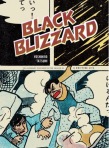 … to use this panel to illustrate a post. Any excuse at all.
… to use this panel to illustrate a post. Any excuse at all.
In this case, it’s because Melinda Beasi, Kate Dacey and I have formed our manga blogging battle robot to talk over the 12th and 13th volumes of Osamu Tezuka’s Black Jack (Vertical) over at Manga Bookshelf.
































